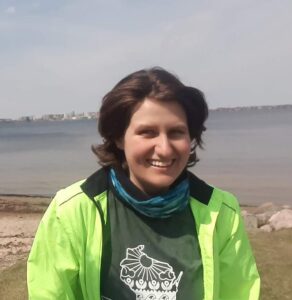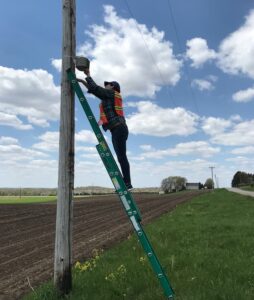Nelson Institute Environment & Resources (E&R) PhD student Elizabeth Berg was recently awarded a fellowship from the United Nations Environment Programme (UNEP) to work on the sixth edition of the Global Environmental Outlook (GEO-6), an international report that aims to assist governments, businesses, and citizens in taking immediate climate action. As a GEO Fellow, Berg will join hundreds of scientists, peer-reviewers, and institutions who are contributing their knowledge and expertise.

The GEO-6 is composed of one main report, which was released in March 2019, and several forthcoming specialized reports that provide specific populations with critical information for addressing the world’s most pressing environmental problems, such as climate change, land degradation, food insecurity, air pollution, and loss of biodiversity.
By compiling environmental assessments and evidenced-based policy recommendations, each report serves as a guide to help specific groups, including cities, youth, businesses, and outreach organizations take environmental action.
Berg first heard about the fellowship from Nelson Institute graduate advisor Jim Miller, who suggested the fellowship would serve as a complement to Berg’s graduate research on regional climate change. While Berg was initially interested in working on the GEO cities report, she said she was surprised to have been selected for the business report, which focuses on helping businesses support and build global sustainable economies.
“I’ve actually never worked much in the private sector at all,” said Berg. “This is a totally different way of approaching some of these questions and problems.”
Welcoming the challenge, Berg said she is excited for the opportunity to learn more about business and economic strategies for addressing environmental problems. The GEO for Business consists of six different briefs, each addressing a specific theme pertinent to building sustainable economies. Berg will be working on the brief that highlights strategies for transitioning from a linear to a circular economy — an economy in which products are reused and repurposed throughout their lifecycle instead of being discarded as trash.
The brief includes contributions from scientists all over the world who have conducted research on sustainable business models. By highlighting a variety of different industries, from textiles and fashion to electronics and food, the brief includes cutting-edge insights that can help business professionals adopt resource efficient and environmentally sustainable practices.
But with many different authors contributing to the brief, and all of them working from different locations across the globe, significant editing is required. This is where Berg steps in. As a GEO fellow, Berg will edit, synthesize, and organize the content to create a thorough and cohesive chapter.
“I’m just at the beginning, but I am very impressed by all the coordination that happens between these authors” said Berg. “It’s an interesting mix of people from academia and the policy world, and also business leaders… [People] who are ahead of the field from all around the world.”
Berg said she is “tying the pieces together” so that the brief can then be sent to reviewers as soon as possible. If all goes as planned, the brief on circular economies will be released in a digital e-book within the first three months of 2021, with the remainder of the business briefs being released on separate dates throughout the year.
While Berg has just begun the editing process, she said the brief provides a “hopeful look” at how corporations in the private sector can progress climate change solutions. This mission — to put research into practice — also pairs well with Berg’s own graduate research, which focuses on how climate change is impacting cities.
As a third-year Nelson Institute E&R student, Berg studies Madison’s urban heat island effect, a phenomenon in which cities experience higher temperatures than surrounding areas due to factors including paved surfaces and buildings that radiate heat. Helping guide this research is Chris Kucharik, UW–Madison professor of agronomy and environmental studies, who has been Berg’s faculty advisor since she joined the program in 2018.

By using a network of 150 temperature sensors that are installed throughout the city of Madison and surrounding rural areas in 2012, Berg is collecting highly detailed temperature measurements that reveal how air temperatures vary from street to street and neighborhood to neighborhood.
Through this research, Berg said she seeks to understand the disparate ways that climate change is impacting local populations.
“The questions I’m most interested in are about risks of extreme heat in cities and who experiences that [risk],” said Berg. “It’s an issue of environmental justice — that there are lots of racial and income patterns in terms of which neighborhoods are warmest.”
Another goal of Berg’s research is to understand the relationship between surface temperatures and air temperatures. By comparing satellite data, which measure the Earth’s surface temperatures, with the data from Madison’s temperature sensors, which measure air temperatures, Berg aims to build a model that will allow researchers to predict air temperature from satellite data.
“So many people use satellite data because it is such an available, accessible tool,” said Berg. “But what it measures is the temperature of the land surfaces, [which] aren’t necessarily the same temperatures that we are experiencing in the air.”
Ultimately, Berg said she strives to use her research in a way that will positively impact local communities. In the future, she hopes to work in community engagement and outreach in order to address problems related to urban heating. Likewise, it was also this desire to put research into practice that drew Berg to apply to the GEO fellowship.
By working on the GEO business report, Berg said she looks forward to learning more about how businesses can put science into practice and emerge as leaders in progressing global sustainability goals.
“That is what excited me about the GEO reports in general,” said Berg. “That [these reports] make this information as accessible and useful as possible. That’s the sort of work that I’m excited about, and I’m really excited about this opportunity to do it in a field that I don’t normally work in.”
Berg completed her master’s degree in Environment & Resources in August 2020 and is now continuing in the program as a PhD student. She is currently preparing to submit her master’s thesis for publication, which focuses on the relationship between land surface temperatures and air temperatures. As she progresses her research of regional climate change, Berg aims to build sustainable communities by bridging the divide between scientific research and applied practice.